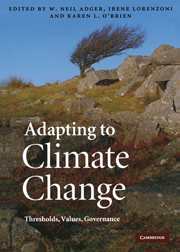Book contents
- Frontmatter
- Contents
- List of contributors
- Preface
- 1 Adaptation now
- Part I Adapting to thresholds in physical and ecological systems
- Part II The role of values and culture in adaptation
- 9 The past, the present and some possible futures of adaptation
- 10 Do values subjectively define the limits to climate change adaptation?
- 11 Conceptual and practical barriers to adaptation: vulnerability and responses to heat waves in the UK
- 12 Values and cost–benefit analysis: economic efficiency criteria in adaptation
- 13 Hidden costs and disparate uncertainties: trade-offs in approaches to climate policy
- 14 Community-based adaptation and culture in theory and practice
- 15 Exploring the invisibility of local knowledge in decision-making: the Boscastle Harbour flood disaster
- 16 Adaptation and conflict within fisheries: insights for living with climate change
- 17 Exploring cultural dimensions of adaptation to climate change
- 18 Adapting to an uncertain climate on the Great Plains: testing hypotheses on historical populations
- 19 Climate change and adaptive human migration: lessons from rural North America
- Part III Governance, knowledge and technologies for adaptation
- 31 Conclusions: Transforming the world
- Index
- References
9 - The past, the present and some possible futures of adaptation
Published online by Cambridge University Press: 31 August 2009
- Frontmatter
- Contents
- List of contributors
- Preface
- 1 Adaptation now
- Part I Adapting to thresholds in physical and ecological systems
- Part II The role of values and culture in adaptation
- 9 The past, the present and some possible futures of adaptation
- 10 Do values subjectively define the limits to climate change adaptation?
- 11 Conceptual and practical barriers to adaptation: vulnerability and responses to heat waves in the UK
- 12 Values and cost–benefit analysis: economic efficiency criteria in adaptation
- 13 Hidden costs and disparate uncertainties: trade-offs in approaches to climate policy
- 14 Community-based adaptation and culture in theory and practice
- 15 Exploring the invisibility of local knowledge in decision-making: the Boscastle Harbour flood disaster
- 16 Adaptation and conflict within fisheries: insights for living with climate change
- 17 Exploring cultural dimensions of adaptation to climate change
- 18 Adapting to an uncertain climate on the Great Plains: testing hypotheses on historical populations
- 19 Climate change and adaptive human migration: lessons from rural North America
- Part III Governance, knowledge and technologies for adaptation
- 31 Conclusions: Transforming the world
- Index
- References
Summary
Introduction
Adaptation is a familiar word in the conversations of people who are concerned about climate change. They use it to describe the processes of adjusting to climate change and its impacts. It describes the actions that must be taken to reduce or eliminate harm, actions whose necessity is unquestionable once the realization strikes that no mitigation plan will be able to bring global warming to a quick halt.
This chapter calls for some reflection on these uses of the word. Though it accepts the urgency of the need to respond to climate change, it questions the naturalness of the term adaptation – the way that it is taken for granted as a key element in climate change policy – and it finds some limits to the term. This chapter suggests that the word does not always capture the full impacts of climate change and that it does not always represent accurately either the perceptions of the people affected by these impacts or the range of alternatives open to them.
This chapter develops these reservations through several sections: (1) a review of the history of the term and its use by international organizations; (2) a presentation of a local community affected by climate change, who constitute one case of the people for whom adaptations are proposed; (3) a discussion of the perceptions of climate change by this local community; (4) a review of four organizations that serve as intermediates between the international and local levels, and that have all adopted the word; and (5) a set of considerations on the way that the term operates in the relations among the international organizations, the intermediary organizations and the local community.
Information
- Type
- Chapter
- Information
- Adapting to Climate ChangeThresholds, Values, Governance, pp. 131 - 163Publisher: Cambridge University PressPrint publication year: 2009
References
Accessibility standard: Unknown
Why this information is here
This section outlines the accessibility features of this content - including support for screen readers, full keyboard navigation and high-contrast display options. This may not be relevant for you.Accessibility Information
- 43
- Cited by
